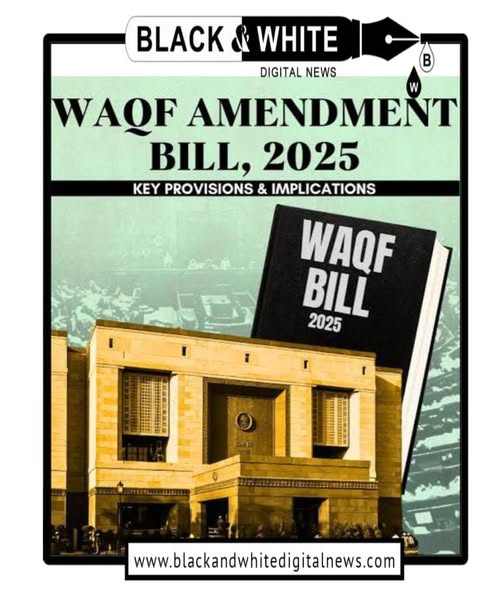BJP’s Waqf Amendment Bill Sparks National Debate: Transparency or Targeted Control?
||Black and White Digital News||
||Tejveer Singh April 02, 2025||
In a move that has set off intense political and social discourse, the Bharatiya Janata Party (BJP) has introduced the Waqf Amendment Bill, aiming to reshape the governance of waqf properties across India. Citing concerns over transparency, alleged mismanagement, and unchecked land control by Waqf Boards, the ruling party claims the amendments are necessary to ensure public accountability. However, opposition leaders and minority groups have accused the government of singling out Muslim institutions while ignoring similar issues in other religious trusts.
The Enormous Waqf Land Holdings:
A recent Hindustan Times report highlights the staggering scale of waqf properties in India. According to official records, waqf institutions own more than 9 lakh acres of land, making them one of the largest landholders in the country—second only to the Indian Railways and the Defence Ministry. These lands include commercial complexes, residential plots, agricultural fields, and heritage structures.
The report also underscores the allegations of irregularities in waqf property management, with cases of encroachments, illegal sales, and unverified lease agreements emerging over the years. This has led to growing concerns over whether waqf assets are truly being used for the welfare of the Muslim community as intended.
BJP’s Justification for the Amendment:
Taking cues from HindustanTimes report, BJP leaders have argued that the Waqf Act, 1995, grants excessive autonomy to Waqf Boards, leading to a lack of oversight. The proposed amendments, they claim, will bring waqf properties under stricter government scrutiny and prevent illegal transfers.
Key Provisions in the New Bill:
The proposed Waqf Amendment Bill introduces several significant changes:
1. Abolition of the Automatic Waqf Land Transfer Clause: Under the current law, once a property is registered as waqf, it is automatically transferred to the Waqf Board’s control. The new bill seeks to require government verification before any land is designated as waqf property.
2. Mandatory Government Oversight: The amendment proposes a central regulatory body to oversee waqf properties, ensuring that the revenue generated is used transparently.
3. Public Access to Waqf Land Records: To prevent misuse and unauthorized land sales, the bill mandates that all waqf property records be digitized and made publicly available.
4. Stronger Legal Framework Against Encroachments: The new bill increases penalties and legal action against encroachments, including stricter provisions to reclaim illegally occupied waqf properties.
5. Periodic Audits and Financial Reporting: The amendment makes it compulsory for Waqf Boards to submit annual financial reports to a government-appointed regulatory body.
A senior BJP leader told us, “This amendment is about ensuring that public land is not misused. Transparency and accountability must apply to all religious institutions. The Waqf Boards cannot function as a law unto themselves.”
Another BJP spokesperson emphasized, “We have seen numerous cases where waqf properties have been misappropriated by vested interests. This amendment ensures that these assets are utilized for genuine community welfare and not for personal enrichment.”
Opposition and Minority Leaders Decry the Move:
Opposition parties and several Muslim organizations, however, see the bill as a deliberate attempt to erode the autonomy of the Waqf Boards. Critics argue that no similar scrutiny is being applied to temple trusts or other religious endowments, making this a selective intervention.
Congress leader Rahul Gandhi remarked, “The BJP’s Waqf Amendment Bill is another step in their divisive politics. If they were truly concerned about transparency, they would have extended the same scrutiny to Hindu religious trusts and other private endowments.”
A prominent Muslim cleric also stated, “This bill is a direct attack on our institutions. It is being presented as an administrative reform, but its true intention is to take control of waqf properties and limit our community’s independence.”
Political and Electoral Implications:
Political analysts suggest that the BJP’s move is strategically timed. With elections on the horizon, the party is looking to consolidate its core Hindu voter base while also appealing to sections of the Muslim community that have raised concerns over Waqf mismanagement.
A political Analyst, said “This is not just about land. It’s about power, perception, and control. By bringing waqf properties under greater regulation, the BJP is sending a strong message about its stance on religious land holdings.”
As the bill moves forward in Parliament, its fate remains uncertain. If passed, it could transform the governance of waqf properties, setting a precedent for state intervention in religious institutions. Whether it ushers in an era of transparency or marks a shift towards increased governmental control remains to be seen. One thing, however, is clear—the Waqf Amendment Bill has already become one of the most polarizing and consequential legislative proposals in recent years.



